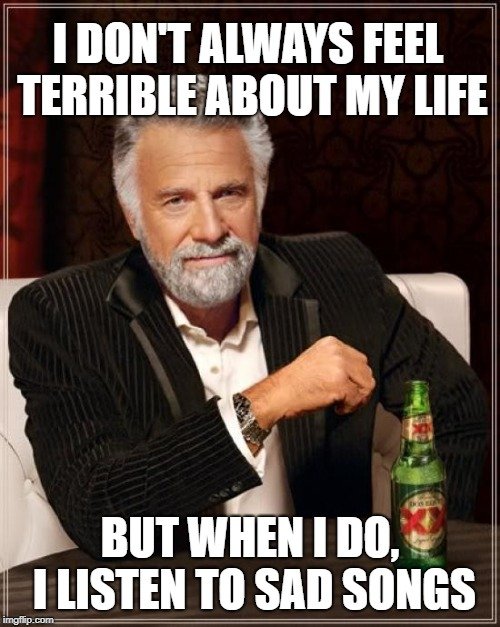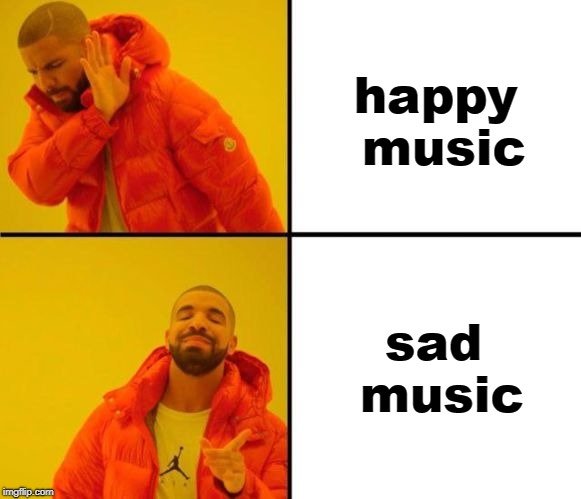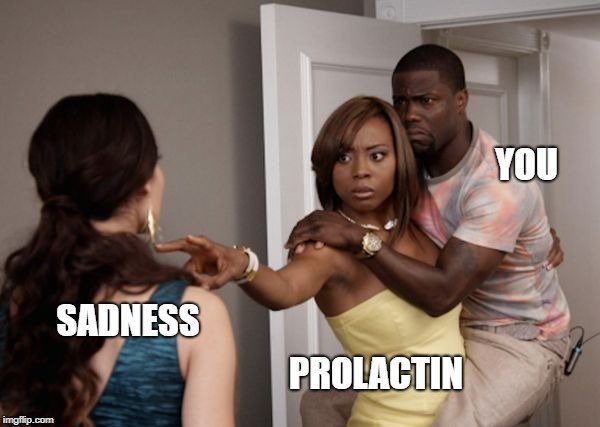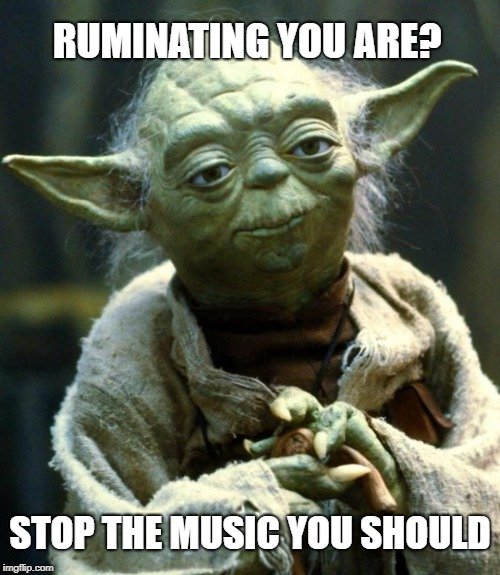People listen to sad music for many reasons. It can make them feel more understood, help them cathartically release negative emotions, or even just make them feel more realistic. However, it’s important to draw a line between a natural grieving process and rumination, as the latter can be detrimental to one’s mental health.
When the weight of existence descends upon my shoulders, my first instinct is often to put on a playlist of tremendously depressing songs on my phone. There have been so many times when I’ve listened to sad music and ended up feeling better! While this is apparently the case for many people, isn’t it a little strange?
On the surface, listening to happy music seems like the logical thing to do when we want to uplift our mood. Why, then, do we usually play the sad songs when we find ourselves feeling blue, and why don’t the happy ones seem to help?

Why Do We Listen To Sad Music When We’re Sad?
Listening to sad music makes us feel more understood. When the words in a song speak to us of our experiences and the music conveys emotions that are similar to ours, we instantly feel like we’re not as alone in it. We feel better about our situation when we believe that someone else has experienced something similar and understands exactly how we feel.
More importantly, it reassures us that there’s nothing wrong with how we feel. The heart-wrenching tunes give us validation, helping us realize that what we’re feeling is completely natural and human, allowing us to then move on more easily.

Listening to sad music is believed to facilitate catharsis from negative emotions. In other words, it allows listeners to bring their own negative emotions to the surface and vent them out, thereby reducing tension and stress. Aristotle, in fact, actually suggested catharsis as an explanation for people’s enjoyment of tragic art.
Also Read: How Do We Recognize Emotions In Music?
Why Do We Hate Listening To Happy Music When We’re Sad?
Listening to happy music seems like a normal thing to do when you want a distraction from the sadness inside yourself, but why doesn’t it always work? More often than not, you end up feeling worse than before!
This is because, while sad music comes across as an empathic person trying to console you, happy music may instead seem like a perky person telling you to smile when you’re annoyed.

Also Read: Why Do We Sometimes Feel Sad For No Reason?
Why Do We Enjoy Sad Music Even When We’re Not Sad?
Many people prefer sad music even when they’re not particularly upset. This is surprising, given the nature of music. Why would anyone want to risk messing up a perfectly good mood by listening to something gloomy?
Sad Music Is ‘Moving’
Happy music, by itself, is often trite and boring. Just because a song expresses happiness doesn’t mean that people will always want to listen to it.
Most people who enjoy sad music would say that it’s more ‘moving’ than any other form of music. One study found that sad music evoked, in addition to sadness, a range of positively toned aesthetic emotions. It also found that the people who scored high for the trait of empathy most appreciated and enjoyed the beauty of sad music. They simply enjoy the emotional arousal that sad music evokes.

Romanticism In Sad Music
Sad music, unlike the situation of actually being sad, comes with a sort of romanticism, which poses no immediate threat. It offers no direct danger or harm—unlike the actual emotion of sadness experienced in everyday life—which allows listeners to enjoy an unpleasant emotion like sadness.
Prolactin: Tricking The Brain
Another reason people enjoy sad music is because of the hormone prolactin. Apart from its connection to lactation, prolactin also has various psychological effects. It is released, both in males and females, in response to grief, sadness or other forms of stress to attenuate the pain through its analgesic effect. When you are in a state of grief, prolactin produces feelings of tranquility, calmness and consolation, thus preventing the grief state from escalating uncontrollably.

When we listen to sad music, we’re essentially ‘tricking’ our brains into thinking that something sad has happened, thus causing a spike in prolactin. However, without any actual feelings of sadness, the effect produced by prolactin would simply result in a notably pleasant state. Even if the listener feels sad after listening to a sad song, he is aware that he’s merely listening to music and that the sadness he feels does not warrant the full negative impact of a true tragedy.
Have Yourself A Good Cry
Many people listen to sad music just to cry and release their bottled-up emotions, even when they aren’t feeling particularly sad about anything.

Sad music also allows people to reflect on important negative life events and make sense of them, even though the listener may experience some sadness while listening. Certain kinds of sad music help this process of thinking over past events, resolving issues and reaching positive conclusions about them.
Depressive Realism
One might suppose that people become pessimistic when they’re sad; however, one research study proves that people are actually more realistic when they’re sad. This is due to a phenomenon called depressive realism. Compared with happiness, sadness has been observed to encourage more detail-oriented thinking and less judgment bias in people. Listening to sad music is believed to induce depressive realism, encouraging more realistic assessments of the likelihood of certain outcomes.
Is Sad Music Actually Bad For Us?
Different people experience sadness differently, and some people are more susceptible to sadness than others. These differences may be due to gender, social and cultural norms, past experiences, physiology and physical fitness.
The effects of listening to sad music may have adaptive or maladaptive outcomes, depending on the factors above. While some people listen to sad music and have pleasurable outcomes of enjoyment or cleansing, some others will ruminate and obsess over their emotions, as though they are being forced into focusing on unpleasant aspects of life. The latter are attracted to sad music, despite the fact that it perpetuates their misery.

It’s very important to draw a line between a natural grieving process and rumination. However, since rumination is associated with clinical depression, it may seldom be a person’s voluntary goal to ruminate. Instead, it may simply be the result of an involuntary bias of the listener towards negative stimuli, a trait that characterizes many mood disorders.
In short, listen to sad music whenever you need a good cry, but don’t let yourself ruminate for too long!
How well do you understand the article above!

References (click to expand)
- Negative Emotion in Music: What is the Attraction? A Qualitative Study - kb.osu.edu
- Why we enjoy sad music | SiOWfa15: Science in Our World. The Pennsylvania State University
- Why do we listen to sad music? | SiOWfa16 - Sites at Penn State. The Pennsylvania State University
- Huron, D. (2011, July). Why is sad music pleasurable? A possible role for prolactin. Musicae Scientiae. SAGE Publications.
- Alloy, L. B., & Abramson, L. Y. (1979). Judgment of contingency in depressed and nondepressed students: Sadder but wiser?. Journal of Experimental Psychology: General. American Psychological Association (APA).
- Vuoskoski, J. K., Thompson, W. F., McIlwain, D., & Eerola, T. (2011, December). Who Enjoys Listening to Sad Music and Why?. Music Perception. University of California Press.
